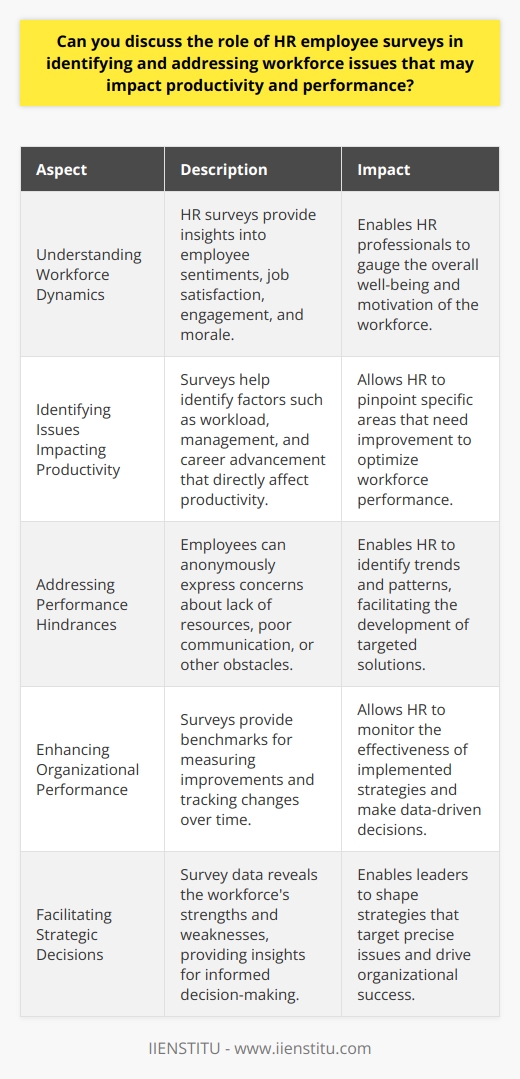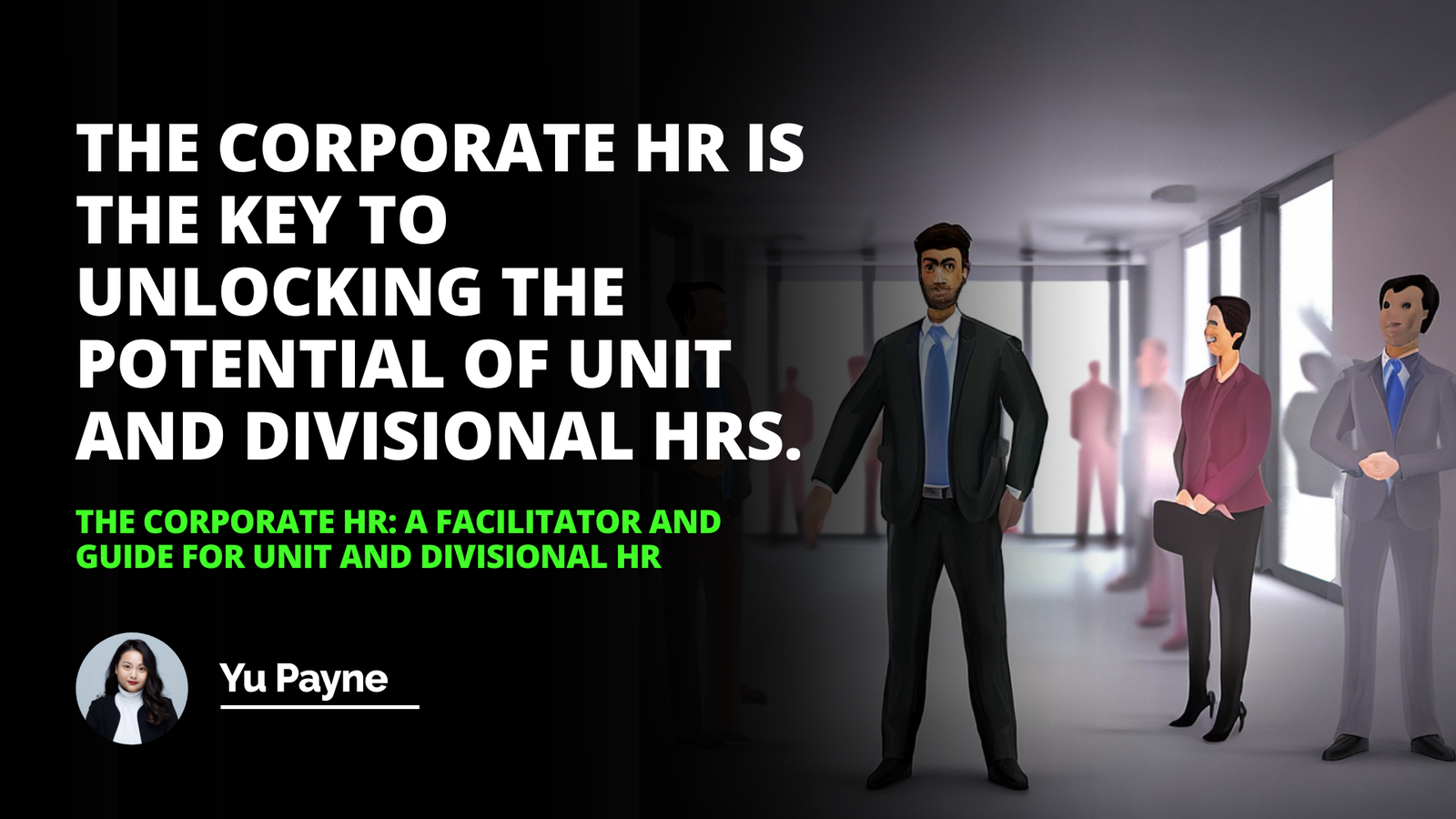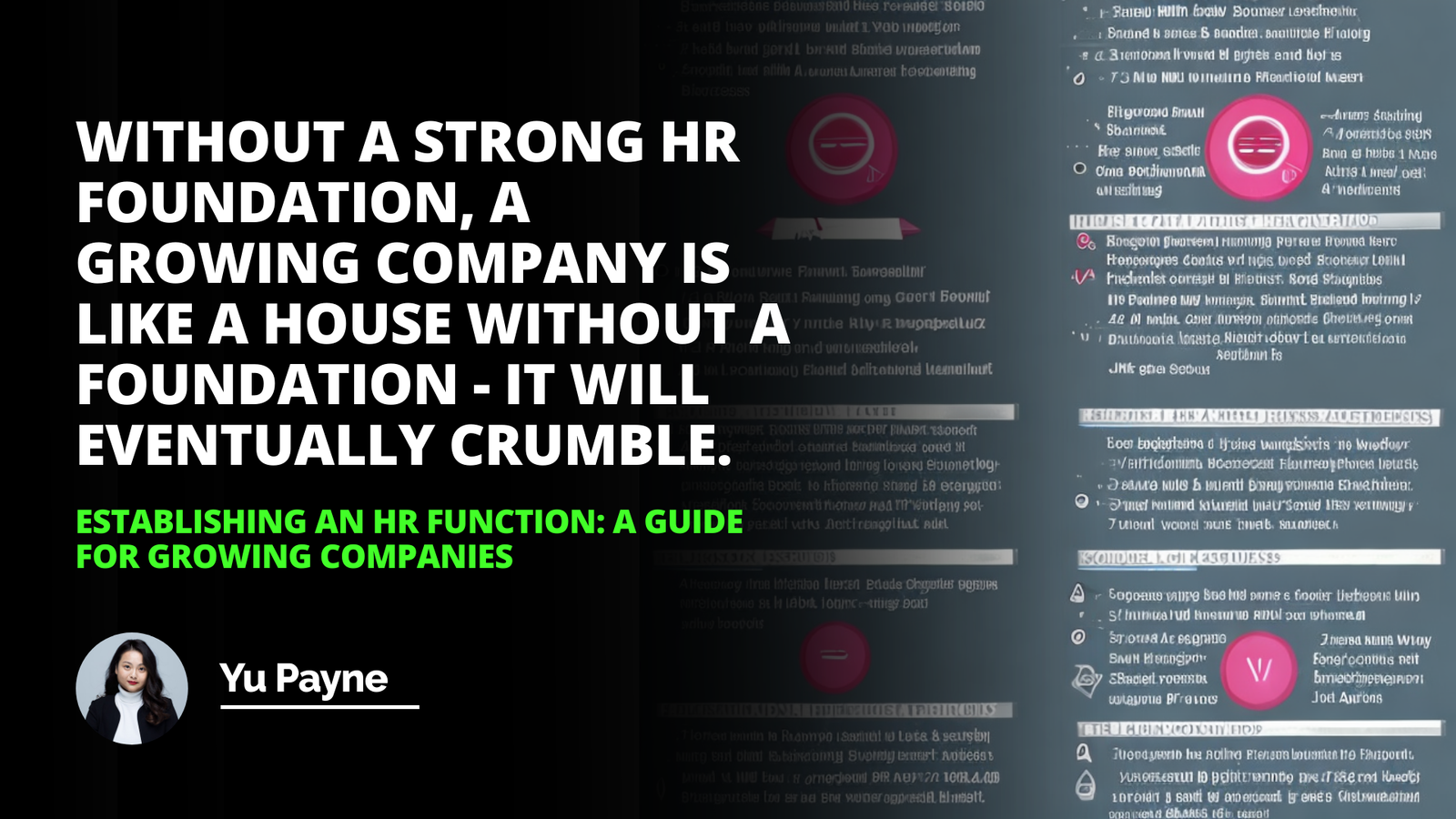
In an ever-evolving corporate landscape, the capacity to gauge employee sentiment is a valuable asset for any organization. Human resources (HR) functions continuously seek out methodologies to not only understand but also enhance the employee experience and, by extension, organizational performance. HR employee surveys emerge as a key tool in this quest, serving as a robust nexus between staff insight and managerial action.
By leveraging meticulously curated inquiries, companies can peer into the core of their workforce's satisfaction and engagement levels. As we begin to unpack the integral role of employee surveys, we will delve into their definition and importance within a business context, and offer a pathway through which such surveys can be transformed into strategic assets that drive performance enhancement.
Introduction to HR Employee Surveys
HR employee surveys are meticulously structured questionnaires designed to elicit a comprehensive understanding of employees' experiences, perceptions, and needs within a workplace. Their applications range from assessing job satisfaction and engagement to identifying potential areas of improvement within organizational structures, practices, and culture. As barometers of internal health, these surveys are instrumental aids in unearthing latent issues that, if left unchecked, could fester into greater discontents, leading to reduced employee performance and morale.
The utility of HR employee surveys in businesses transcends mere data collection; they act as conduits for two-way communication between staff and managers, fostering an environment of transparency and mutual respect. In a climate where employees’ voices are heard, and their feedback valued, there emerges a foundation for enhanced job satisfaction and loyalty. As such, HR employee surveys are not just reflective tools but also proactive measures in shaping a positive workplace culture.
A precursor to the subsequent discussion, this blog aims to furnish readers with a nuanced understanding of the functions and ramifications of HR employee surveys on organizational dynamics. We shall explore the role of these surveys in understanding employee sentiment, the design of effective questionnaires, methods of data analysis, and the application of findings to elevate employee satisfaction and corporate performance.
The Role of HR Employee Surveys
The relevance of HR employee surveys is multi-faceted, serving to cast light on the inner workings of an organization from the employee’s vantage point. Such surveys are instrumental in rooting out factors contributing to disengagement or dissatisfaction, hence allowing HR professionals to devise informed strategies that address these concerns head-on. Through consistent feedback, companies can keep a finger on the pulse of their corporate climate, preemptively addressing potential issues before they escalate into broader problems.
Employee surveys form a critical part of strategic HR planning. By converting employee feedback into actionable insights, HR departments are equipped to craft policies that directly touch upon the workforce’s core needs and aspirations. This symbiosis between employee input and strategic HR initiatives ensures that organizational plans are not created in a vacuum but instead reflect the authentic dynamics and desires within the workplace.
Examples abound of companies who have adeptly implemented HR employee surveys to remarkable benefit. For instance, a renowned global tech firm instituted a series of employee engagement surveys that influenced a revamp of their performance evaluation process, leading to greater clarity in objectives and more meaningful employee appraisals. Such pragmatic applications underscore the transformative potential of employee feedback when harnessed effectively.
Key Benefits of Regular HR Employee Surveys
Regular HR employee surveys produce numerous benefits that ripple throughout an organization, enhancing not merely the work atmosphere but also the bottom line. Improved morale frequently stems from these surveys, as employees feel valued and understood when their opinions shape company practices. This sense of investment translates into increased dedication and productivity, potent catalysts for business success.
Data from research studies substantiates the advantages gleaned from frequent survey administration. Companies that engage in routine employee feedback mechanisms report not only a surge in worker satisfaction but also heightened retention rates and customer satisfaction indices. These outcomes highlight a clear linkage between internal survey practices and external business performance metrics.
The feedback loop created by these surveys nurtures a culture of continuous improvement. Organizations evolve in tandem with their employees' growth, ensuring that transformations within human capital are paralleled by advancements in managerial strategies and corporate frameworks. Such alignment between employee aspirations and organizational goals is keenly sought in today’s highly competitive business environment.
Designing Effective HR Employee Surveys
The creation of effective HR employee surveys demands an acute sensitivity to factors that influence their success. Confidentiality, for instance, is paramount, as it reassures respondents that their candidness will not be met with unfavorable repercussions. Clarity in survey design ensures that questions are both comprehensible and capable of eliciting meaningful responses, while relevance ensures that the information sought is of genuine utility in addressing organizational objectives.
Performance Appraisal Strategies For Evaluating Employee Effectiveness
Maximizing Hrm Potential With Varied Job Roles And Responsibilities
Balancing the breadth and depth of questions is also vital, aimed at garnering rich insights without overloading respondents. Conciseness, therefore, becomes essential in formulating questions that are to the point yet substantive enough to capture nuanced feedback. This delicate interplay ensures surveys elicit the most valuable data in the most efficient manner possible.
Employers looking for practical inspiration might consider various effective HR survey questions, such as queries about the clearness of role definitions, accessibility of resources needed for job performance, or perceptions of organizational support for career advancement. Examples such as these reveal the range of topics pertinent to a comprehensive understanding of the employee experience.
Implementing Surveys and Achieving High Response Rates
Encouraging full participation in HR employee surveys predicates on a strategy that underscores the importance of each individual’s feedback. Transparent communication about the survey’s intent and the assurance of anonymity bolsters the likelihood of high response rates. Leading by example, where managers and leaders partake in the survey process, may also serve as a compelling motivator for staff participation.
However, the survey process is not without its challenges. Survey fatigue, skepticism about the efficacy of feedback mechanisms, and concerns about anonymity can all hinder participation. Overcoming these barriers requires an iterative approach to survey design and implementation, informed by employee feedback and the evolving cultural context of the organization.
Fostering a climate of trust is essential for any survey's success. Employees must have confidence that their responses are confidential and that their feedback will lead to real change. By establishing such trust and ensuring that surveys are easy to complete and accessible, organizations can maximize engagement and acquire a wealth of insights into employee perspectives.
Analyzing and Utilizing Survey Data
Interpreting the data harvested from HR employee surveys is both an art and a science. The analytical phase involves decoding the vast quantities of qualitative and quantitative inputs and discerning patterns and trends that offer actionable insights. Translating this intelligence into initiatives that can be integrated into HR strategy is the key to unlocking the full potential of employee feedback.
Tactful communication of the findings from the surveys is yet another aspect of the process. By clear conveyance of what has been learned and what is being considered as a result, HR departments can demonstrate responsiveness and accountability. This, in turn, contributes to a culture of trust and encourages future candor from employees.
Real-life anecdotes supply tangible context for the application of survey data. Whether it be a company that restructured its teams based on feedback regarding collaboration challenges or an organization that introduced new health and wellness programs following employee requests, such cases provide relatable and instructive examples for survey data deployment.
Addressing Employee Concerns and Implementing Changes
Once issues have been identified through HR employee surveys, the task at hand is to constructively address these concerns. HR departments must navigate the intricacies of divergent employee needs while devising solutions that dovetail with the wider strategic aims of the organization. This necessitates a proactive and creative approach, one that synthesizes feedback into meaningful policy alterations.
The dissemination of survey outcomes is integral to maintaining trust and engagement within the workplace. This communication should be candid and transparent around both the survey’s findings and the planned course of action. Such openness acknowledges employee contributions and reinforces the importance of their perspectives.
Acting upon survey results not only resolves specific points of contention but also signals to employees that their opinions matter and that the company is committed to continuous improvement. This demonstration of responsiveness can energize the workforce, augment their engagement and, ultimately, translate into amplified satisfaction and productivity levels.
In recapitulation, the pivotal role of HR employee surveys in enhancing workforce performance cannot be overemphasized. From serving as a barometer of employee sentiment to informing strategic HR initiatives, their utility in fostering a responsive and dynamic workplace culture is pronounced. Regular, effectively designed, and well-implemented surveys cultivate an atmosphere where employees feel heard and valued—a fertile ground for satisfaction, innovation, and organizational success.
The potency of regular and well-executed employee surveys is reflected in the manifold positive impacts they engender, extending from the individual to the organizational level. By diligently analyzing and acting upon the insights gained, HR departments can bolster the company’s resilience and adaptability in the face of change.
We invite you to integrate the insights provided herein and welcome feedback on your experiences with HR employee surveys or additional points of discussion. Your perspectives enrich the ongoing conversation around these essential tools and their implementation within dynamic business environments.
Frequently Asked Questions
How do HR employee surveys contribute to the overall performance enhancement in an organization?
Understanding HR Employee Surveys
HR employee surveys serve as critical tools. They gauge workplace sentiment. Surveys clarify employee needs and concerns. This feedback enables informed HR decisions. Organizations depend on such data-driven insights. They underpin strategies to enhance performance.
Surveys and Employee Engagement
Employee engagement links directly to performance. Engaged employees often exhibit higher productivity. They provide better service. This increases customer satisfaction. Thus, profitability often improves. Surveys help HR to understand engagement levels. They identify drivers and barriers to engagement.
HR can tailor strategies based on survey results. They focus on areas needing improvement. This focuses efforts effectively. It maximizes impact. It promotes a culture of continuous improvement.
Identifying Training and Development Needs
Surveys highlight training needs. Employees express views on skills gaps. HR can then design relevant programs. This impacts employee performance positively. Workers equipped with necessary skills perform better. They feel valued and invested in. This boosts morale. High morale often correlates with enhanced productivity.
Streamlining Communication
Effective communication is vital. Surveys often reveal communication issues. HR detects these gaps. They address them through targeted actions. Clear communication increases understanding of organizational goals. It aligns employee efforts with these goals. This alignment improves overall performance.
Encouraging Transparency and Trust
Transparency builds trust. Trust fosters a positive work environment. Surveys show organization's willingness to listen. Employees feel their opinions matter. This encourages open dialogue. An open culture improves collaboration. Better collaboration leads to innovative solutions. Innovation drives performance.
Enhancing Retention Rates
Retention is key. High turnover is costly. It disrupts continuity. Surveys reveal reasons behind employee turnover. This knowledge is invaluable. HR implements strategies to retain talent. A stable workforce maintains institutional knowledge. It ensures consistent performance.
Aligning Goals and Expectations
Surveys help clarify organizational goals. Employees understand expected performance standards. Alignment between goals and performance emerges. Employees strive towards shared objectives. This unity enhances overall organizational performance.
Conclusion
HR employee surveys are integral. They provide a voice to the workforce. This voice guides strategic decision-making. An organization uses feedback to improve. Surveys lead to targeted actions. These actions enhance employee satisfaction. They align workforce efforts with business goals. Thus, they boost overall performance significantly.
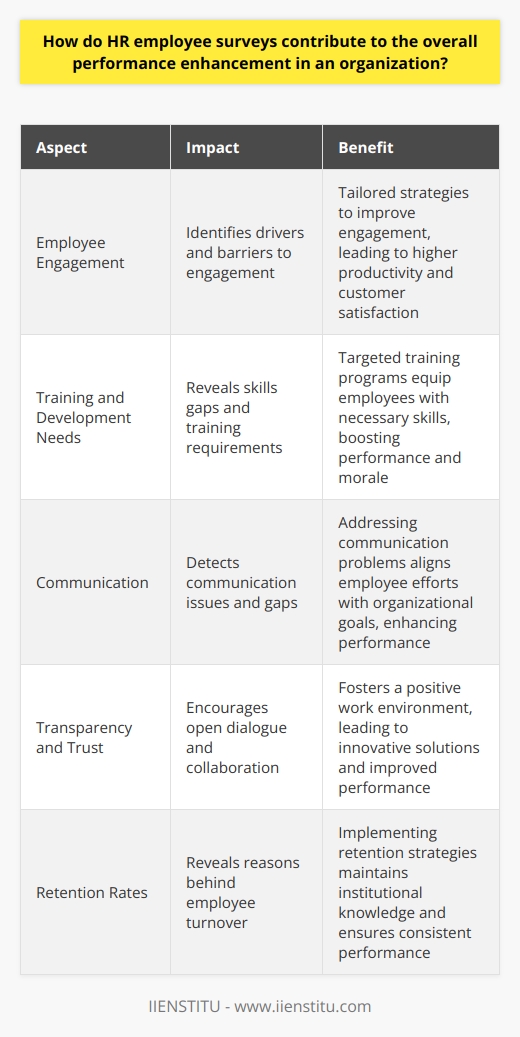
What key factors should be considered when designing and implementing HR employee surveys for optimal performance improvement?
Identifying Objectives
Before crafting an HR employee survey, pinpoint clear goals. Understand the survey's purpose. It might assess workplace satisfaction, identify training needs, or measure employee engagement. Goals determine content and structure.
Ensuring Anonymity and Confidentiality
Anonymity breeds honesty in responses. No employee ID links to survey data. Staff feel safe voicing true feelings. Promised confidentiality can raise survey participation rates. Assurance of this must be unquestionable.
Crafting Relevant Questions
Questions require careful design for reliable results. Avoid ambiguity. Simple language is key. You want precise answers to specific queries. Tailor questions to the objectives. Ensure they relate directly to actionable factors within the organization.
Alignment with Organizational Culture
The survey must mirror company culture and values. What rings true for employees will yield genuine responses. Matching questions with the company's unique environment enhances relevance and encourages thoughtful participation.
Choosing the Right Survey Length
Surveys should engage, not overwhelm. Keep them short but comprehensive. Too long, and participants lose interest. Around 10-15 minutes balances depth with convenience. Beyond that, response rates typically fall, and data quality may suffer.
Pilot Testing
Trial runs are critical. They pre-empt potential hiccups. Get a small group to test the survey's effectiveness. Assess clarity and time to complete. Adjust based on feedback.
Using a Likert Scale
A Likert scale quantifies subjective data. It simplifies measurement of attitudes and opinions. Ensure scale options range evenly, from negative to positive. Maintaining a neutral midpoint often aids in capturing a fair response.
Timing and Frequency
Avoid survey fatigue. Time surveys to suit the workforce. Common practice suggests annual or biannual surveys. Launching during a low-stress period increases participation. Consistent timing year-to-year allows for trend analysis.
Communicating the Process
Employees must grasp the survey's significance. Explain the 'why' and 'how' beforehand. Detail how the process will help them. Clear communication from leaders fosters a culture of candor.
Offering Incentives
Sometimes, incentives drive participation up. Ensure incentives are appropriate and equitable. They should not unduly influence responses. Monetary or recognition-based incentives can work.
Analyzing and Acting on Results
Review data promptly and thoroughly. Look for trends and areas needing improvement. Share results with the workforce. They must see how their feedback leads to change. Craft action plans to address key issues.
Follow-up
Post-survey, keep the dialogue open. Provide updates on intervention progress. Use focus groups or department meetings for ongoing engagement. Feedback should create a cycle of continuous improvement.
Conclusion
HR employee surveys provide critical insights for performance improvement. Thoughtful design and implementation are pivotal. Adhere to these factors for meaningful and actionable feedback. Employ surveys as tools to foster a healthier, more productive workplace.
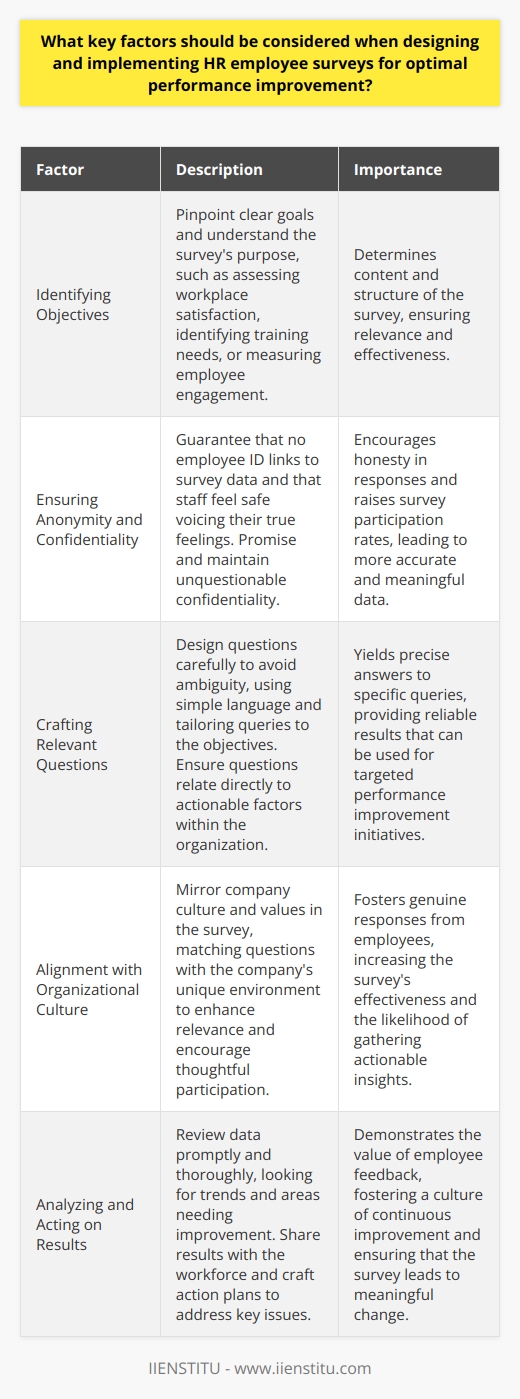
Can you discuss the role of HR employee surveys in identifying and addressing workforce issues that may impact productivity and performance?
The Role of HR Employee Surveys
Understanding Workforce Dynamics
HR employee surveys serve as critical tools. They unveil the pulse of an organization. Through these surveys, HR professionals can tap into employee sentiments. They gather invaluable data on various aspects. This includes job satisfaction, engagement, and morale.
Identifying Issues Impacting Productivity
Identifying issues becomes systematic with HR surveys. These issues oftentimes directly impact productivity. Common factors identified include workload, management, and career advancement. HR surveys bring these to light.
Addressing Performance Hindrances
Surveys also highlight performance hindrances. These may include lack of resources or poor communication. Employees express their concerns anonymously. This anonymity encourages candidness. HR identifies trends and patterns through responses.
Enhancing Organizational Performance
HR surveys provide benchmarks for measuring improvements. To boost performance, you need these benchmarks. They allow for the tracking of changes over time. HR can thus monitor the effectiveness of strategies implemented.
Encouraging Employee Voice
They empower employees. They offer a platform for their voices. This inclusive approach enhances engagement. It fosters a sense of ownership among the workforce. Consequently, it can lead to improved commitment.
Facilitating Strategic Decisions
Leaders require solid insights for strategic decisions. HR surveys supply this data. They reveal the workforce's strengths and weaknesses. These insights enable informed decision-making. Thus, they shape strategies that target precise issues.
Promoting Positive Change
Positive change stems from understanding and action. HR employee surveys lay the foundation for both. By identifying problem areas, HR can initiate appropriate interventions. These interventions support a more productive and satisfied workforce.
Conclusion
In conclusion, HR employee surveys stand at the core of intelligent HR practices. They not only identify workforce issues but also facilitate targeted solutions. These surveys can transform the workplace. They help forge a path for enhanced productivity and performance.
